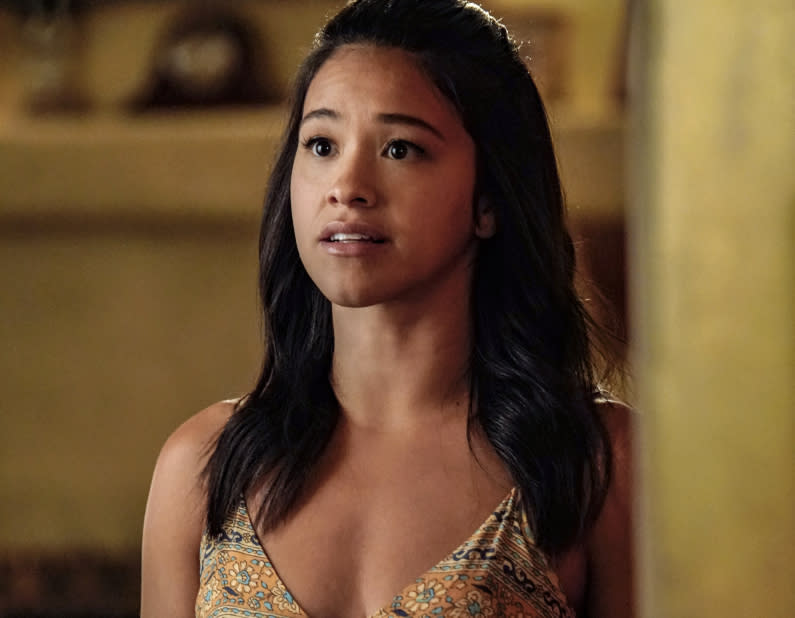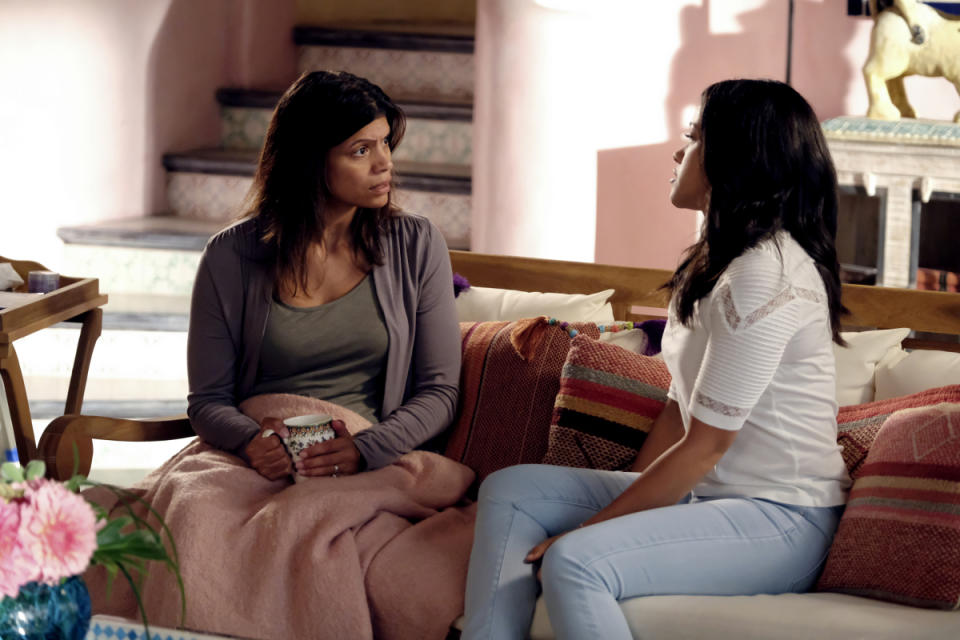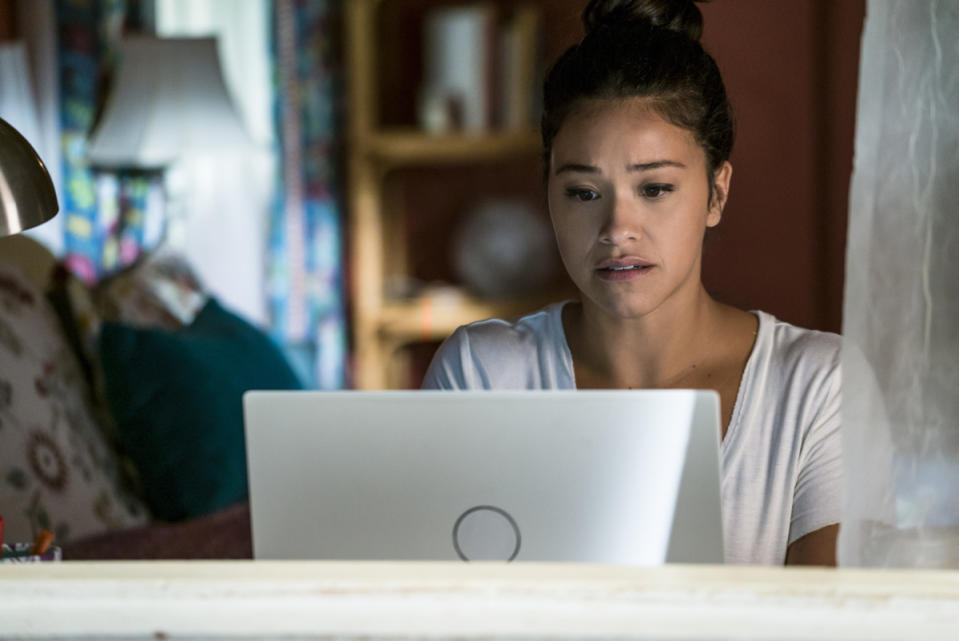‘Jane the Virgin’ Review: That 7-Minute Epic Monologue Is Everything That’s Great About the Series

[Editor’s Note: The following contains spoilers from “Jane the Virgin” Season 5 premiere episode, “Chapter Eighty-Two.”]
“Jane the Virgin” returned in top form Wednesday night for the premiere of its final season and resolved two cliffhangers: Who JR (Rosario Dawson) shot and the apparent return of Jane’s husband Michael (Brett Dier) from the dead after four years. Both of these sensationalized stories stay true to the show’s telenovela roots, but the latter is this season’s pièce de résistance, through which the show explores how Jane (Gina Rodriguez) has grown and the ways that one forms a sense of self.
Related stories
'Abby's' Review: Natalie Morales' Lovable West-Coast 'Cheers' Just Needs Time to Brew
'The Twilight Zone' Review: Jordan Peele's CBS All Access Reboot Enters a Rich New Dimension
'Barry' Review: Season 2 Builds a Brilliant Black Comedy That Earns Its Darkness
It turns out that this man is indeed Michael, but through an elaborate scheme, someone faked his death and gave him amnesia with electroshock therapy. He now calls himself Jason — after Jason Bourne — and has built a life for himself in Montana. Jason isn’t anything like Michael; he lacks humor, speaks in a slow drawl, and — most distressingly — is no longer a cat person (sorry, Faith N. Whiskers III). He has no memory of Jane or any of the Villanueva clan, and even his palate and preferences have changed.
As viewers, it’s disturbing to watch this man who looks like Michael treat his own wife like a stranger, and for Jane, it’s even harder to experience this firsthand. Michael’s personality reset makes her question her concept of what forms identity — not only for him, but herself as well. In an extended, seven-minute, one-take scene that screams “Emmy submission,” Rodriguez delivers a speech that reveals Jane’s inner turmoil. And while the show is known for its signature twists, colorful narration, and imaginative use of graphics, Jane’s monologue encapsulates why the show’s merits run deeper than those surface quirks.

Andrea Navedo and Gina Rodriguez, “Jane the Virgin”
The series has always been a master of tone: balancing the lighthearted, campier aspects with an unwavering heartfelt core. The monologue takes the viewers on an emotional ride as Jane confides in her mother Xo (Andrea Navedo) and grandmother Alba (Ivonne Coll) about her confusion and fears. It’s not an accident that her family is there in the scene, present and supportive as they’ve always been throughout the series. As Jane spins out, consumed with the implications of Michael’s return, she becomes absent-minded, forgetting to heat the kettle, rambling with her mouth full, and eventually just walking around without her pants. It’s these small, hilarious details that give the show its emotional authenticity, embracing sentiment without devolving into melodrama (at least when it comes to Jane’s journey). Expect to cry at least once per episode for this final run.
The monologue also showcases the series’ presentation of the Latinx-American cultural experience in an everyday, matter-of-fact way. Even though chunks of Alba’s Spanish-spoken dialogue are translated through subtitles, when Jane sprinkles in cognates such as “inhala, exhala,” it’s not accompanied with onscreen text. It simply exists for the viewer to accept. Similarly, when Jane pauses mid-ramble to ask her grandmother if she made arepas, no awkward explanation is given for what that food is. Instead, Jane is simply seen eating it. As with shows like “Fresh Off the Boat” and “Vida,” “Jane” aims to normalize, not Otherize these cultural aspects.
Most of all, the speech goes to the heart of what “Jane the Virgin” is all about: the growth of Jane and how she defines herself. She’s embraced being a widow and the grief that comes with it for so long, she has no clue what she’s supposed to feel now that Michael is alive. And yet, because he’s forgotten her, she doesn’t feel like a wife, but instead feels rejected, negated. This confusion is reflected in her comment to the cat, “Faith N. Whiskers, you remember that person who loved you so much because he was a cat person? Well, guess what? You’re out!”
In the same vein, Michael has stopped being a Jane person. Or has he? An ongoing line that viewers have latched onto throughout the seasons involves one of Michael’s comments about always believing that he and Jane belong together. The omniscient narrator once proclaimed that Michael would never stop loving Jane, “and for as long as Michael lived, until he drew his very last breath, he never did.” But if Michael is no longer Michael, what does this mean for his love for Jane?

Gina Rodriguez, “Jane the Virgin”
It’s an existential dilemma that Jane as a writer can’t help but trying to categorize or identify. “You tell all these stories about yourself and that’s who you are. That’s your identity,” she says. “And I’m a widow… I mean, that’s not all that I am. I’m a mother and a daughter and a published-freaking-author.”
In fact, from the outset, the show has tried to define Jane through its title. “Jane the Virgin” outlines the show’s premise, but post-virginity, the series has taken a creative approach to the title by crossing out or eliminating the word “Virgin” onscreen and replacing it with a new identifier. For this episode, she has been labeled “Jane the Forgotten.” Next week, she’ll have a new moniker. It’s thrilling to discover new aspects of this person week to week. She is all of those things, but in the end, no matter what the designation is, it’s enough that she is just Jane.
Watch the epic speech below:
Grade: B+
”Jane the Virgin” airs Wednesdays at 9/8c on The CW.
Sign up for Indiewire's Newsletter. For the latest news, follow us on Facebook, Twitter, and Instagram.

